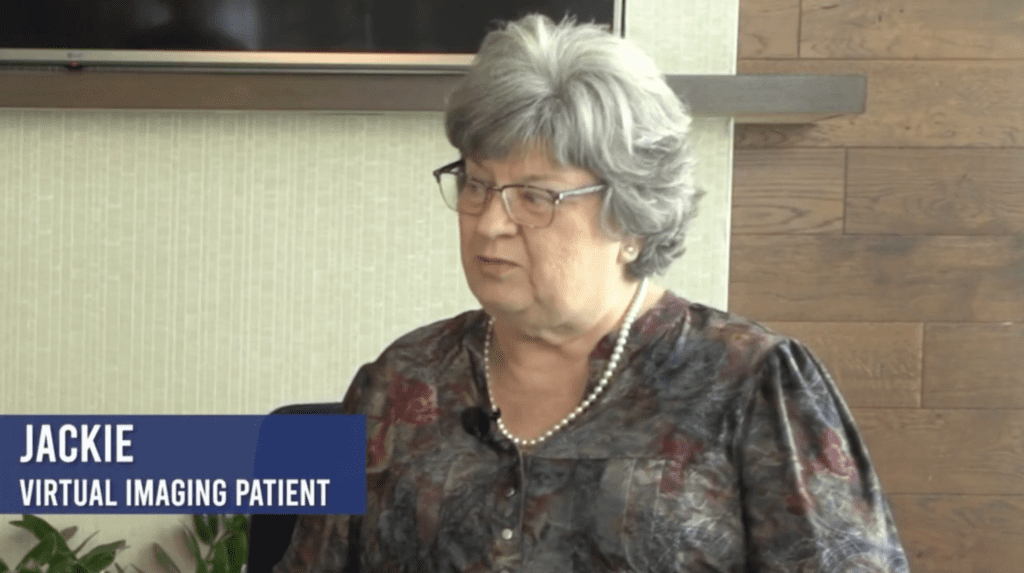Your Body
Your Body is Your Temple, Understand It
Our Bodies are Complex Machines that Require Maintenance. Early Detection Helps You Maintain Your Body Like Exercising.
At Virtual Imaging, we specialize in providing advanced medical imaging solutions to detect
various types of cancers at an early stage, even before symptoms appear. Our LDCT scans cover
various areas of the body, including the lungs, heart, abdomen, and pelvis, to detect different
types of cancers and conditions.
Pancreatic Cancer
At Virtual Imaging, we use our low-dose CT scans to detect early signs of pancreatic cancer.
Pancreatic cancer is one of the deadliest forms of cancer, with a five-year survival rate of only
10% when detected at an advanced stage. However, the survival rate can increase to 25% with
early detection through LDCT screening. According to the American Cancer Society, people with
an increased risk of pancreatic cancer may benefit from screening with CT scans starting at age 50
or earlier.

Aneurysms
Similarly, abdominal aortic aneurysms and thoracic aortic aneurysms are life-threatening
conditions that can be detected through our low-dose CT scans. According to the Centers for
Disease Control and Prevention, approximately 15,000 people die each year in the United States
from an aortic aneurysm rupture. However, the risk of rupture can be significantly reduced with
early detection and timely intervention.
Abdominal aortic aneurysms occur when the wall of the aorta, the main blood vessel in the abdomen, weakens and bulges outward. Thoracic aortic aneurysms occur when the same happens in the chest area. While many aneurysms may not show any symptoms, some people may experience sudden and severe pain in the chest, back, or abdomen.
Abdominal aortic aneurysms (AAA) and thoracic aortic aneurysms (TAA) are serious medical conditions that can have life-threatening consequences if left untreated. The rupture of an aneurysm is a medical emergency, and immediate treatment is necessary to prevent serious complications or death.
It is important to note that aneurysms may not cause any symptoms until they rupture, which is why prophylactic screening with low-dose CT virtual scans can be a valuable tool in detecting these conditions at an early stage. At Virtual Imaging, we offer comprehensive imaging solutions to detect aneurysms and other conditions before they cause serious harm. Contact us at 770-730-0119 to schedule your low-dose CT scan and take control of your health.
Abdominal aortic aneurysms occur when the wall of the aorta, the main blood vessel in the abdomen, weakens and bulges outward. Thoracic aortic aneurysms occur when the same happens in the chest area. While many aneurysms may not show any symptoms, some people may experience sudden and severe pain in the chest, back, or abdomen.
Abdominal aortic aneurysms (AAA) and thoracic aortic aneurysms (TAA) are serious medical conditions that can have life-threatening consequences if left untreated. The rupture of an aneurysm is a medical emergency, and immediate treatment is necessary to prevent serious complications or death.
It is important to note that aneurysms may not cause any symptoms until they rupture, which is why prophylactic screening with low-dose CT virtual scans can be a valuable tool in detecting these conditions at an early stage. At Virtual Imaging, we offer comprehensive imaging solutions to detect aneurysms and other conditions before they cause serious harm. Contact us at 770-730-0119 to schedule your low-dose CT scan and take control of your health.
Kidney Cancer
Kidney cancer, also known as renal cell carcinoma, is a type of cancer that originates in the
kidneys. It is essential to be aware of the signs and symptoms associated with kidney cancer to
facilitate early detection and improve treatment outcomes. While some cases of kidney cancer
may not present noticeable symptoms in the early stages, there are several indicators that
individuals should be mindful of.
Common symptoms of kidney cancer include blood in the urine (hematuria), which may appear as pink, red, or dark-colored urine. Additionally, individuals may experience persistent pain in the back or side, below the ribs. This pain can range from a dull ache to sharp discomfort. Other possible signs include a palpable lump or mass in the abdomen, unexplained weight loss, fatigue, and intermittent fevers. It is important to note that these symptoms may also be indicative of other health conditions.
Detecting kidney cancer early can significantly impact treatment options and overall prognosis. According to the American Cancer Society, the five-year survival rate for individuals diagnosed with localized kidney cancer (confined to the kidney) is approximately 92%. This emphasizes that regular screenings, such as low-dose CT scans, can aid in identifying kidney cancer at its early stages when the chances of successful treatment and recovery are the highest.
At Virtual Imaging, we are committed to providing state-of-the-art imaging solutions that facilitate early detection of kidney cancer. Our experienced team and advanced technology can help identify potential abnormalities.
Contact us at 770-730-0119 to schedule your low-dose CT scan and gain valuable insights into your health. Don’t delay taking charge of your well-being—early detection offers greater opportunities for successful treatment and improved long-term outcomes.
Common symptoms of kidney cancer include blood in the urine (hematuria), which may appear as pink, red, or dark-colored urine. Additionally, individuals may experience persistent pain in the back or side, below the ribs. This pain can range from a dull ache to sharp discomfort. Other possible signs include a palpable lump or mass in the abdomen, unexplained weight loss, fatigue, and intermittent fevers. It is important to note that these symptoms may also be indicative of other health conditions.
Detecting kidney cancer early can significantly impact treatment options and overall prognosis. According to the American Cancer Society, the five-year survival rate for individuals diagnosed with localized kidney cancer (confined to the kidney) is approximately 92%. This emphasizes that regular screenings, such as low-dose CT scans, can aid in identifying kidney cancer at its early stages when the chances of successful treatment and recovery are the highest.
At Virtual Imaging, we are committed to providing state-of-the-art imaging solutions that facilitate early detection of kidney cancer. Our experienced team and advanced technology can help identify potential abnormalities.
Contact us at 770-730-0119 to schedule your low-dose CT scan and gain valuable insights into your health. Don’t delay taking charge of your well-being—early detection offers greater opportunities for successful treatment and improved long-term outcomes.
Other Assessments
At Virtual Imaging, our LDCT scans can also detect other diseases and conditions, such as liver disease, kidney stones, and pulmonary embolisms. Early detection of these conditions can enable timely intervention and treatment, reducing the risk of complications and improving health outcomes.
Some other assessments include:
- Thyroid
- Internal Organ Screening
- Stomach
- Liver
- Spleen
- Gall Bladder
- Kidneys
- Bladder
- Adrenal Glands
- Lymph Nodes
- Uterus/Ovaries
- Prostate
How we can help
Low-dose CT scans can provide crucial insights into your health status and detect various diseases
and conditions at an early stage, including some of the deadliest forms of cancer and life-threatening aneurysms. At Virtual Imaging, we are committed to providing state-of-the-art imaging solutions and personalized care to our clients. Contact us at 770-730-0119 to learn more about our services and schedule your scan today. Don’t wait until it’s too late to take control of your health!

Complimentary heart scan and consultation with a few minimum qualifications.


